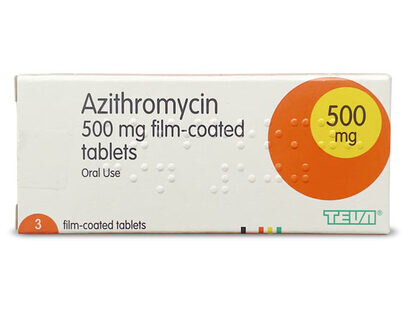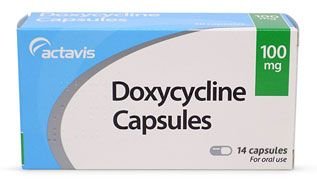Before we can issue a treatment, you’ll need to answer a short assessment. This assessment will help us recommend the right treatment for you.

Azithromycin Tablets
From £13.99
Doxycycline - Chlamydia Treatment
From £13.50
Our site uses cookies. By continuing to use our site you agree to our cookie policy.
Free delivery on orders over £50
Before we can issue a treatment, you’ll need to answer a short assessment. This assessment will help us recommend the right treatment for you.
Sexually transmitted diseases can sometimes be embarassing to get treatment for, but at Ashcroft Pharmacy we make sure you can be treated discretly and safely. Once you have confirmed your diagnosis through a chlamydia test kit, fill out the health questionnaire below and we will deliver your treatment to your doorstep.


About Chlamydia?
Chlamydia is a common sexually transmitted infection (STI). Chlamydia can be contracted at any age but it is most common in those under the age of 25.
It is caused by a bacteria and is not easily noticeable at early stages due to a lack of noticeable early symptoms. Chlamydia treatment is preferred, as untreated chlamydia can cause serious complications in the future.
Contact the healthcare profession in case you have any recent concerns.
It can be spread through unprotected sex (vaginal, anal, or oral), sharing sex toys or your genitals coming into contact with another person’s genitals.
Diagnosis of chlamydia
The only way to know if you have chlamydia is to get tested. Fortunately, the available methods of testing are quick and painless.
You can purchase chlamydia tests online, or you can go to your GP or local sexual health clinic, where you can have a chlamydia test for free.
For a physical examination,a healthcare professional examines your discharge, sores, and spots in infected areas. Chlamydia is diagnosed in women by swabbing the vagina or any other infected areas, such as the throat or anus.
A Chlamydia test is often a urine sample that is sent to a laboratory for analysis. If you test positive for chlamydia, your sexual partner(s) must be treated for chlamydia at the same time to avoid reinfection.
The results may take several days. The doctor’s office should call to discuss the results. If the test returns positive, a follow-up appointment and treatment options will be discussed.
After a diagnostic test,you can wait up to 10 days to get your results. A follow-up with your healthcare professional will be appropriate, especially if you tested positive for chlamydia.
It is also advised that you contact any sexual partners you have had in the last six months and let them know that you have tested positive for chlamydia. Leaving chlamydia untreated can cause many complications such as infertility.
Prevention for chlamydia
The only solution is to get tested regularly in case you have new partners. You should take the following measures to reduce the risk of contracting chlamydia:
Chlamydia is one of the most common sexually transmitted infections (STIs) in the UK, affecting both men and women, with approximately 3 to 7 out of 100 sexually active young individuals, particularly those under the age of 25.
In 2022, about 690,531 chlamydia tests were done for young women aged 15 to 24 in England, slightly less than the previous year by 1.2%.
But here's the thing - even though fewer tests were done, there was a significant 21.8% increase in the number of actual diagnoses made in 2022 (68,882) compared to 2021 (56,562).
Sources
https://www.nhs.uk/conditions/chlamydia/
https://cks.nice.org.uk/topics/chlamydia-uncomplicated-genital/
Chlamydia is caused by bacteria called Chlamydia Trachomatis and can be spread between people through the sexual fluids produced by the penis and vagina.
This means chlamydia can be transmitted without penetration or ejaculation. Chlamydia cannot be caught through casual contact, e.g. holding hands, kissing, or sharing household outcomes such as towels, baths or cutlery.
Unprotected Sex:
Chlamydia is commonly transmitted through sexual activities that lack protection, such as vaginal, anal, or oral sex without using barrier methods like condoms.
Vertical Transmission (Mother to Child):
Chlamydia can be passed from an infected mother to her baby during childbirth. This highlights the importance of early detection and treatment in pregnant individuals to prevent potential complications in newborns.
The two most commonly prescribed treatments for chlamydia are:
You are advised to complete the course of treatment even though the infection stops, and if symptoms persist while still receiving treatment, you should visit your healthcare provider for more evaluation.
If you tested positive for chlamydia, you should also get your partner's chlamydia treatment to prevent reinfection.
Risks associated with multiple chlamydia infections in women.
Most people that are suffering from chlamydia do not experience symptoms at all (estimated that 40-96%). When noticeable symptoms occur, it will usually be 1 to 3 weeks after being exposed to the infection.
Chlamydia symptoms in women include:
Chlamydia symptoms in men include:
If chlamydia is left untreated, you are at risk of many complications such as infertility. If you have chlamydia, you must get it treated. It will NOT go away on its own, it will in fact get a lot worse.
Most people do not show symptoms at all (about 40-96%). It can take one to three weeks for the symptoms to develop, however they can occur months later. You can have no symptoms but still carry the infection and have the ability to infect others.
It is important you tell your current partner and other sexual partners within the last 6 months if you have been tested positive for chlamydia to prevent further spread of chlamydia and to prevent complications
Yes. Chlamydia is completely curable after taking a short course of antibiotics. This is the only way to cure chlamydia.
You may want to get chlamydia treatment without being tested if you have had unprotected sex witth someone that has chlamydia.
You can also get a Chlamydia test to see if you have a positive result. If you do get a positive result, you will need to take antibiotic treatment to cure your Chlamydia infection.
You may experience a vaginal discharge with an unpleasant odor, though chlamydia cannot always be detected through smell.
Chlamydia symptoms are not easily noticeable during the early stages, so you could have been infected from a previous sexual relationship even though it was 3 months ago.
Get tested for chlamydia with your new partner to stay safe and prevent the spread of infections.
Regular and immediate treatment is recommended since, if left untreated for a long period of time, it can permanently damage a woman's reproductive system.
Multiple complications can be experienced by men.They include chlamydial urethritis, epididymitis, and prostatitis.
To prevent spreading Chlamydia to your partner, it is advisable to have sex after 7 days of completing your antibiotic dose.
For the Doxycycline Chlamydia Treatment Antibiotic, you need to wait 7 days to have sex or until the completion of your course of treatment.
Order Monday to Friday before 14:00pm to guarantee next day delivery